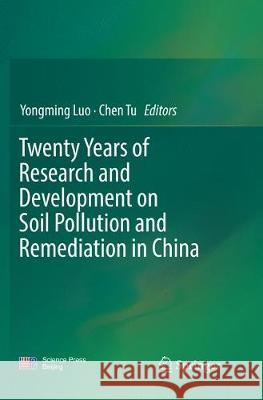Twenty Years of Research and Development on Soil Pollution and Remediation in China » książka
topmenu
Twenty Years of Research and Development on Soil Pollution and Remediation in China
ISBN-13: 9789811355523 / Angielski / Miękka / 2019 / 818 str.
Kategorie:
Kategorie BISAC:
Wydawca:
Springer
Język:
Angielski
ISBN-13:
9789811355523
Rok wydania:
2019
Wydanie:
Softcover Repri
Ilość stron:
818
Waga:
1.35 kg
Wymiary:
23.62 x 23.88 x 3.81
Oprawa:
Miękka
Wolumenów:
01











